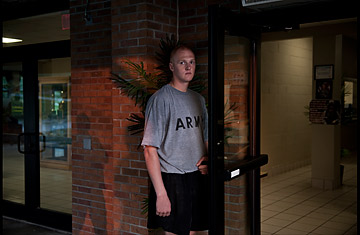
A recruit at Fort Jackson holds open the door to the mess hall during breakfast hours.
(2 of 8)
Thanking our troops for their service has become almost reflexive in the U.S., in part because of memories of Vietnam. Uniformed soldiers striding through airports are offered outstretched hands and words of gratitude; their tabs for sandwiches or beers are often picked up by strangers before the GIs have asked for the bill. But the sentiment reflects the problem: the public has scant idea of just how much the military has given since 9/11 beyond a vague sense that some 6,300 have died.
"We love the troops, and you know why we love the troops?" asks Jack Jacobs, a retired Army colonel. "Because we don't have to be the troops." He recalls growing up in New York City in the years after World War II. "Everybody in my neighborhood had someone who was in uniform," says Jacobs, who won the Medal of Honor in Vietnam. "But today, you'd have to knock on something like 150 doors in most neighborhoods before you find a household where someone is serving."
Rebecca Townsend, an Army National Guard spouse who counsels troubled military families outside Fort Campbell, Ky., sees "lots of evidence of this huge disconnect" between troops and everyone else. She was floored when professional acquaintances praised President Obama's recent decision to bring the troops home from Iraq. "They said it was awesome that there would be no more war," she recalls. "It was very disheartening to learn that they had no idea we are still fighting in Afghanistan."
How Did We Get Here?
Being an Army apart isn't a problem for the Pentagon; it has become part of the sales pitch. The U.S. military boasts of the ways in which it is better than society as a whole. And by many measures, it is right. If you remove those who are unlikely to serve because they are too fat or too criminal or are in college, only 15% of Americans ages 17 to 24 are eligible to sign up. "Today's military is more educated and has a higher aptitude than the general population," a Pentagon recruiting report notes. "Its ranks are filled with extraordinarily well-qualified and committed professionals." Soldiers and sailors are more highly paid, more likely to be married and more conservative politically than the nation as a whole. "From the first day of training you're constantly reminded that you signed on the dotted line because you want to be better," Army vet Matt Gallagher, who served in Iraq, says. "A lot of guys feel they're part of a warrior caste, separate and distinct from society."
